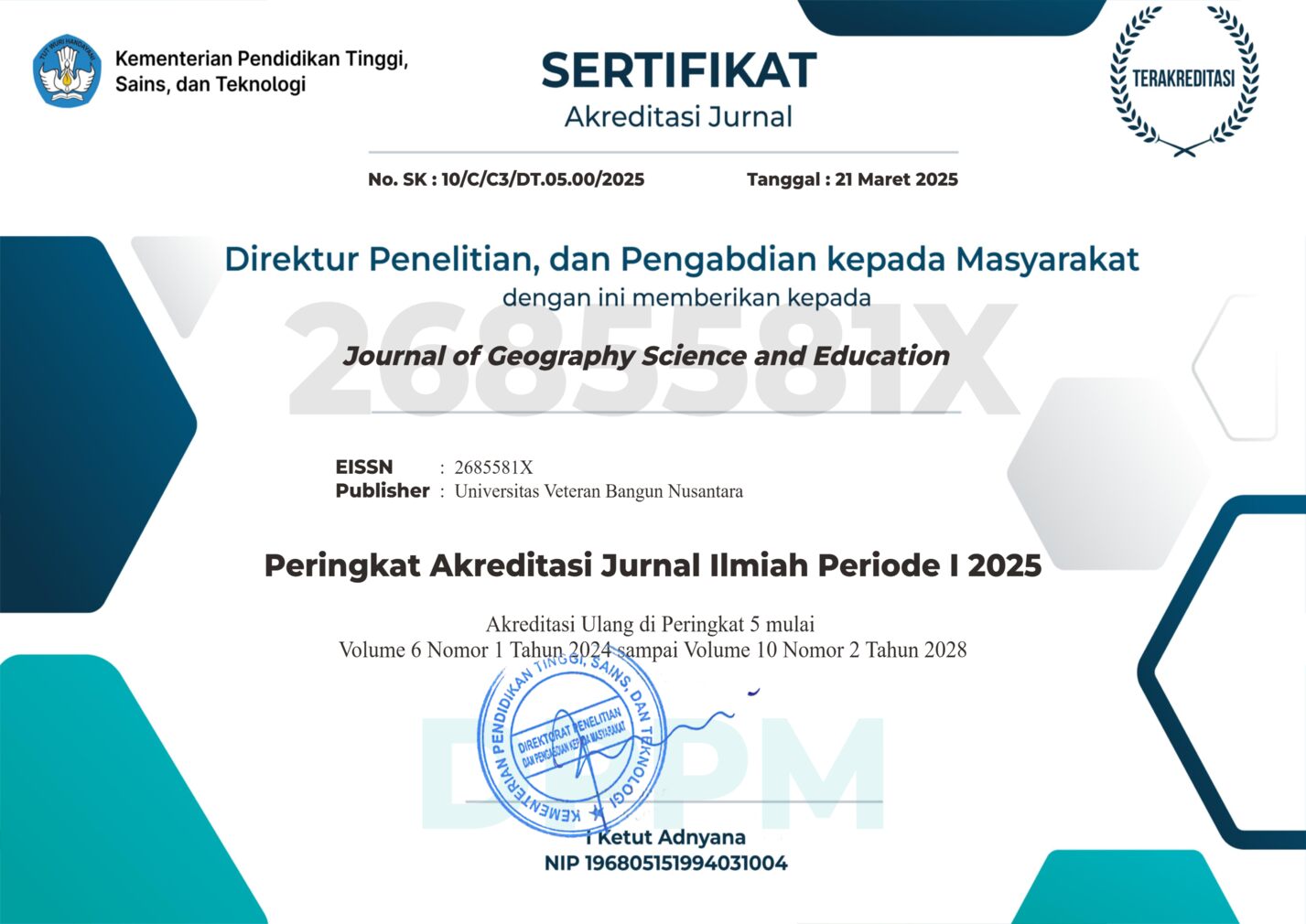SOCIO-ECONOMIC CONDITION OF GAMELAN CRAFTER IN WIRUN VILLAGE MOJOLABAN SUBDISTRICT SUKOHARJO DISTRICT 2019
DOI:
https://doi.org/10.32585/jgse.v1i2.468Abstract
This study aims to find out: (1) The Socio-Economic Condition of Gamelan Craftsmen in Wirun Village, Mojolaban District, Sukoharjo Regency. (2) Level of Education of Gamelan Craftsmen in Wirun Village, Mojolaban Subdistrict, Sukoharjo Regency. (3) Distribution of Gamelan Home Industries and Gamelan Marketing Range in Wirun Village, Mojolaban District, Sukoharjo District.
This study used qualitative descriptive, namely describing and knowing the socio-economic conditions of gamelan craftsmen in Wirun Village, the level of education of gamelan craftsmen in Wirun Village and knowing the distribution of the gamelan industry in Wirun Village and also the marketing range of the gamelan industry. The data collection techniques used are through field direct observation, interviews and documentation. Data analysis techniques used are analysis of descriptive data and table data.
The results of this study are: (1) the socio-economic conditions of gamelan craftsmen totaling 26 craftsmen of all ages 15-64 years, the highest level of education is high school, the income level of 20 craftsmen ranges from 1,920,000-2,400,000, the number of family dependents is dominated by 3-5 people, the gamelan industry stands on average 10-50 years (2) The results of the highest education level of children at the level of high school / vocational and craftsman children are predominantly female. (3) The results of the spread of the gamelan industry are 6 industries and the majority of marketing reach the island of Bali.
Keywords: distribution, gamelan, craftsmen
Downloads
References
Ananta,Dimas Bagus “Pengaruh Keberadaan Industri Sirup Jeruk Nipis Peras Terhadap Kondisi Sosial Ekonomi Masyarakat Desa Ciawigebang Kecamatan Ciawigebang Kabupaten Kuningan,’’Skripsi pada universitas Pendidikan Indonesia Bandung,2014
Damsar dan Indrayani. 2009. Pengantar Sosiologi Ekonomi. Jakarta: PRENADAMEDIA GROUP
Departemen Pendidikan Nasional Undang-Undang RI tahun 2010 tentang sistem Tingkat Pendidikan
Kiefer, and Lillesand. 1990. Penginderaan Jauh dan Interpretasi Citra. Jogjakarta: UGM Press.
Marfai, Aris. 2015. Pemodelan Geografi. Yogyakarta : Ombak
Minda Rafiani (2018) Jangkauan Pemasaran Home Industri Intip Desa Jati Kecamatan Sumberlawang Kabupaten Sragen.
Moleong, Lexy. J. 2007. Metode Penelitian Kualitatif. Bandung: Rosda Karya
Muhimatun Afidah (2014) Kehidupan Sosial Ekonomi Penduduk Pembuat Batubata Di Desa Rejosari Kecamatan Brangsong Kabupaten Kendal .
Pasal 1 UU.RI No 20 tahun 2003 tentang sistem pendidikan nasional Republik Indonesia tahun 1989. Undang – undang Nomor 2 Tahun1989 tentang tingkat pendidikan Lembaran Negara RI Tahun 1989, dibuat di Jakarta.
Republik Indonesia tanggal 29 juni 1984. Undang – undang Nomor 5 Tahun 84 tentang perindustrian oleh Presiden. Lembaran Negara RI Tahun 1984, dibuat di Jakarta
Soekanto, Soerjono dan Budi Sulistyowati. 2015. Sosiologi Suatu Pengantar. Jakarta: RajaGrafindo Persada
Sugiyono, 2008. Metode Penelitian Kuantitatif, Kualitatif dan R&D. Bandung : Penerbit Alfabet
Sutanto, 1994. Penginderaan Jauh dan Interpretasi Citra Jilid 1, cetakan III. Jogjakarta: UGM Press.
Sutanto, 1994. Penginderaan Jauh dan Interpretasi Citra Jilid 2, cetakan III. Jogjakarta :UGM Press
Tika, Moh. Pabundu.2005. Metode Penelitian Geografi. Jakarta: Gramedia Pustaka Utama
Downloads
Published
How to Cite
Issue
Section
License
Authors who publish with the Journal of Geography Science and Education agree to the following terms:
- Authors retain copyright and grant the journal the right of first publication with the work simultaneously licensed under a Creative Commons Attribution License (CC BY-SA 4.0) that allows others to share the work with an acknowledgment of the work's authorship and initial publication in this journal.
- Authors are able to enter into separate, additional contractual arrangements for the non-exclusive distribution of the journal's published version of the work (e.g., post it to an institutional repository or publish it in a book), with an acknowledgment of its initial publication in this journal.
- Authors are permitted and encouraged to post their work online (e.g., in institutional repositories or on their website) prior to and during the submission process, as it can lead to productive exchanges, as well as earlier and greater citation of published work.










